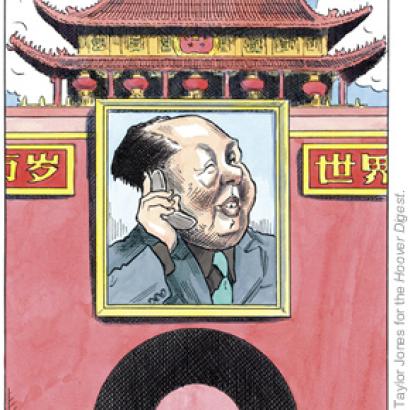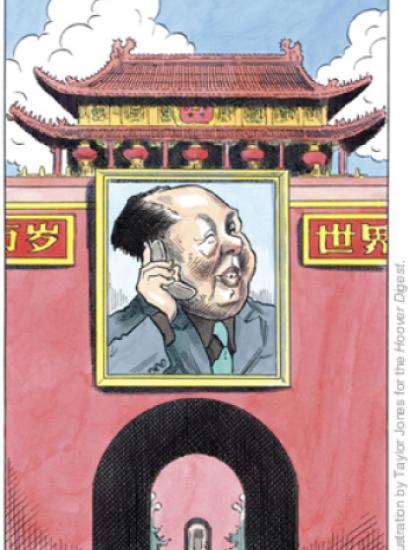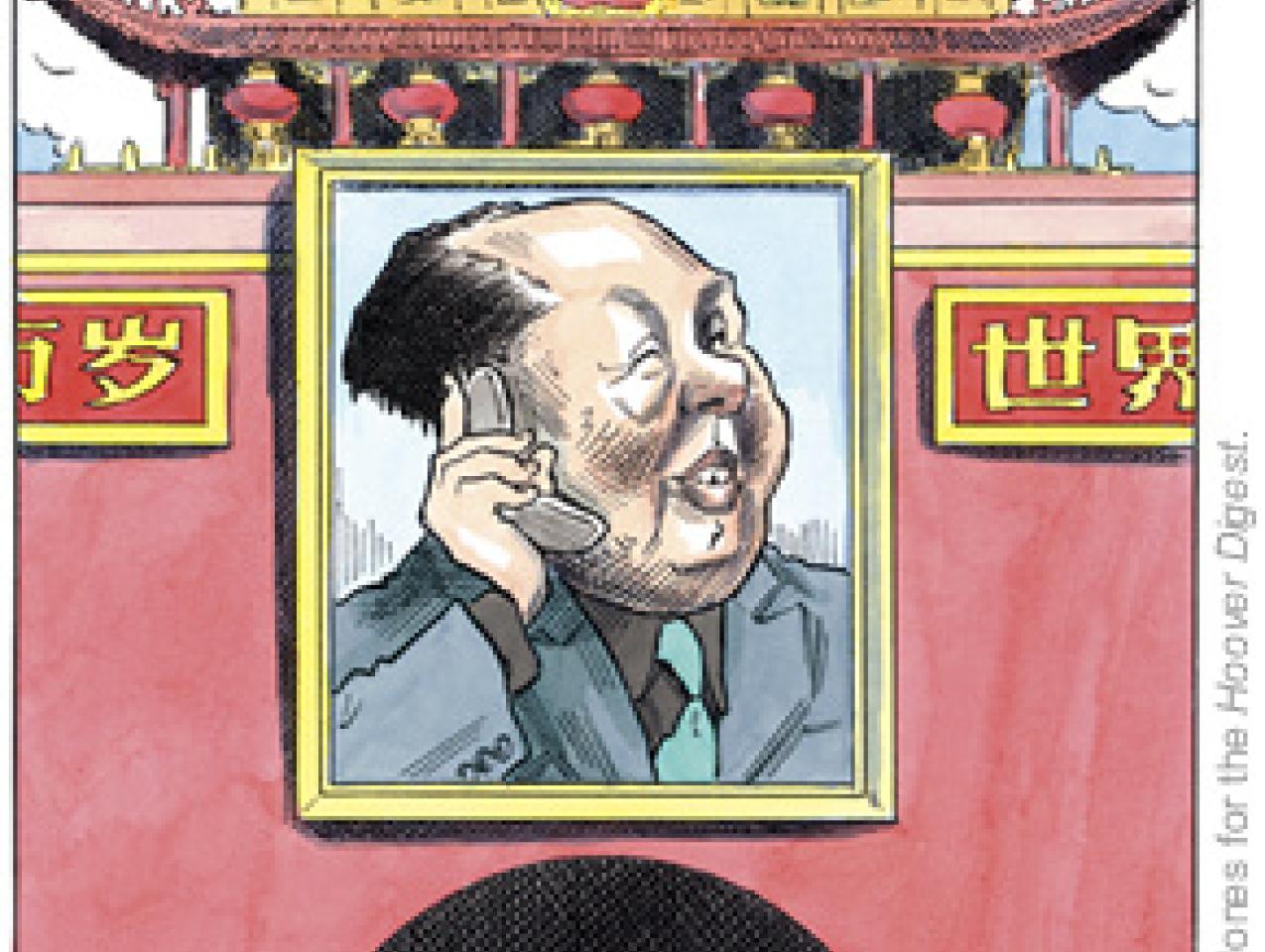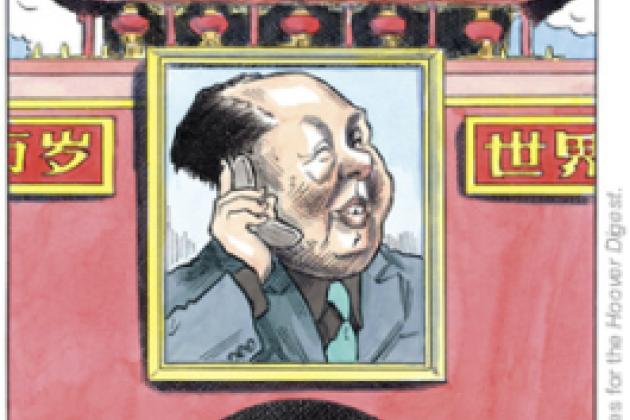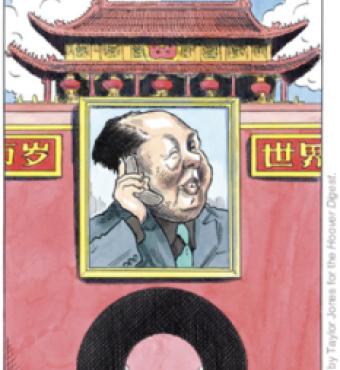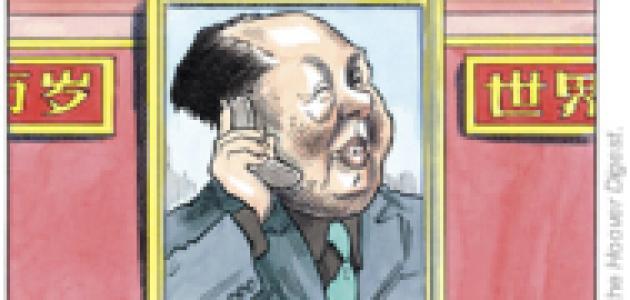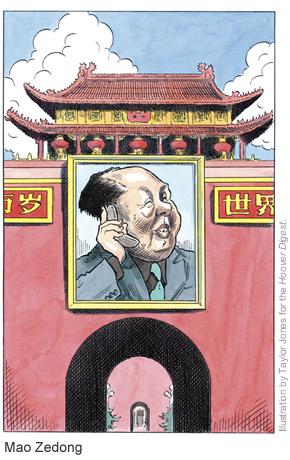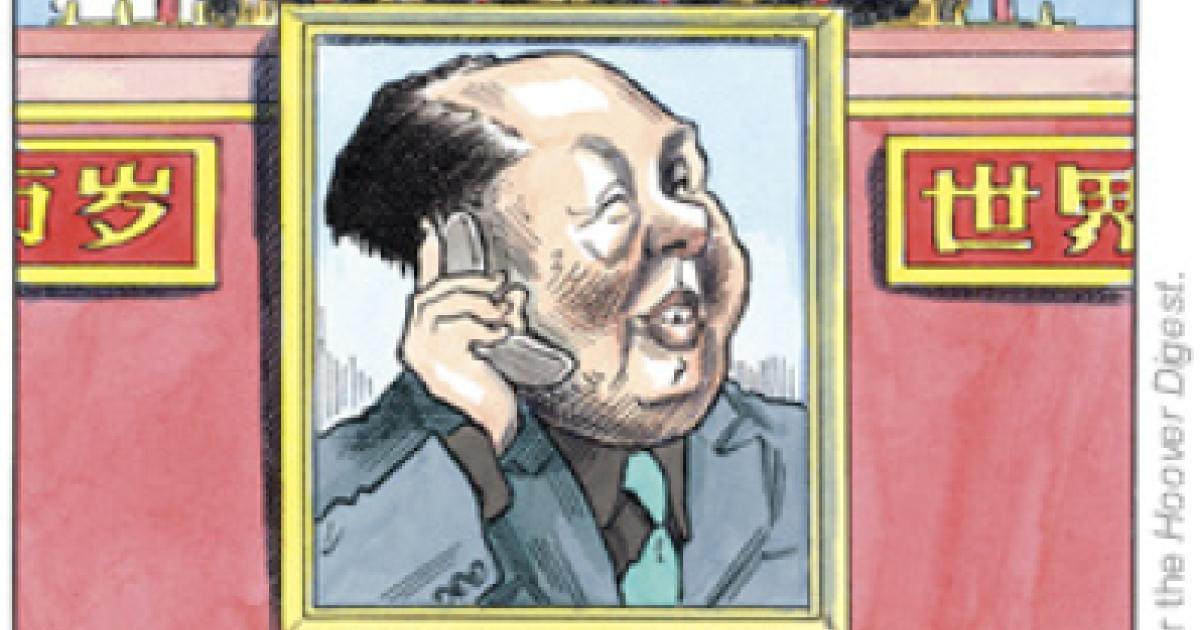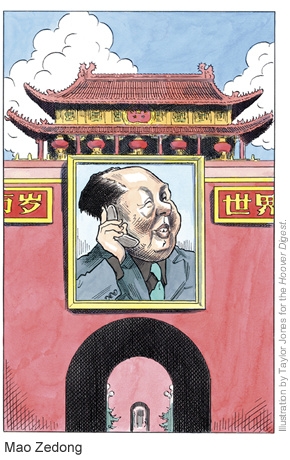
In his recent State of the Union address, President Bush said that spreading democracy throughout the world was the best way to make our country secure. He brilliantly redefined our struggle in Iraq, turning it from a predicament that wiser leaders might have avoided into a quest for a world free of terrorism. The inspiring spectacle on January 30 of courageous Iraqis going to the polls gave his bold words a ring of credibility, as he evoked an American idealism going back to the foreign policies of Woodrow Wilson, Franklin Delano Roosevelt, and Jimmy Carter. In February, he showed that he meant what he said, when he and Secretary of State Condoleezza Rice chose to adopt a confrontational posture in dealing with not only the dictatorships in North Korea and Iran but also undemocratic tendencies in Russia and Egypt.
The president’s foreign policy, however, is based on two dubious premises: (1) that in any society democratization is the key to the improvement of political life and (2) that the feasibility of democratization is not contingent on cultural conditions.
The Bush administration mistakenly assumes people in just about all cultures are ready and eager to put primacy on the long and difficult struggle to build workable democratic institutions. True, in a great variety of cultures many people say they want “freedom,” “democracy,” and “human rights,” and they indeed are eager to vote. For many of them, however, freedom, democracy, and human rights just refer vaguely to a world free of the misuse of authority. People hoping for such an ideal world are not necessarily ready to put primacy on a pragmatic quest for prosperity and political freedom, that is, to view political opponents as partners in negotiation rather than enemies of morality and to accept the moral imperfections of public life as the necessary price of practical, secular, piecemeal progress. Consider the complicated case of China. It well illustrates a utopian outlook at odds with this pragmatic quest.
Changing China?
There has long been a Western tendency vastly to exaggerate the extent to which foreign influences can outweigh the indigenous culture in the shaping of Chinese political life. In his extraordinary book To Change China, the distinguished Yale historian Jonathan Spence some four decades ago recounted the trials and tribulations of Westerners from the sixteenth through the twentieth centuries who came to China confident they could remake it in the image of the West and ended up perplexed and frustrated. The earlier ones wanted to Christianize China; the later ones, to communize or modernize it. Perpetuating this quixotic Western tradition, the great Harvard historian John K. Fairbank pictured Mao Zedong as pragmatically seeking the modernization of China and ignored his utopian metaphysics. Fairbank was then astounded when Mao launched his atrocious Cultural Revolution aimed at creating an “ideal China” with a “new culture” free of egoism.
After the horrors of this movement became apparent to the Chinese in the 1970s, they turned to the West as a model of modernity and increasingly liberalized their society, especially by institutionalizing a market economy. Once again, China experts in the West saw the Chinese as finally accepting a pragmatic approach to economic and political organization and so gradually adopting the Western mix of capitalism and democracy. Today, Westerners watch Chinese students in U.S. universities avidly seeking careers in business and science; Chinese businesspeople skillfully creating a dynamic market economy; Chinese political leaders efficiently designing policies to lubricate this economy; and virtually all Chinese families using every practical means available to pursue wealth and prestige in the modern occupational structure. It seems impossible to deny that the pragmatism of modernization has now finally become the modern Chinese cultural mainstream. As before, however, this new Western image of the pragmatic Chinese is one-sided and euphoric—a bubble of hope bound to burst.
Chinese intellectuals today—their conversations unconstrained by any fear of political repression, their publications to a large extent free of taboos—have created an ideological marketplace including much explicit admiration of the West’s (even Taiwan’s) capitalism and democracy. Yet their heated intellectual debates by no means revolve around the practical problem of how to catch up to Taiwan or the West. What they revolve around is a deep ambivalence about Western democracy and capitalism and, still more surprisingly, a deep ambivalence about the very political movement that so tragically delayed the modernization of China, Maoism.
Respect for Mao’s basic ideals is of course still integral to the official ideology. Attachment to these ideals, however, is also basic to the thinking of influential Chinese intellectuals speaking and writing freely in China’s leading academic centers as well as universities in the United States and the rest of the world. Their thinking overlaps that of current Western radical movements hostile to globalization and capitalism but goes further.
Samuel Huntington’s thesis of the “clash of civilizations” is not beyond criticism, but it accurately points to major tensions between cultures. In the Chinese case, such tensions have often been superseded by the Chinese determination to emulate Western modernity. Yet long before the rise of Maoism, even before World War I, the Chinese had begun to combine this determination with a belief that Western capitalistic modernity is perverse. What many Chinese found perverse was what Ayn Rand most explicitly celebrated: an egotistically rationalistic search for wealth, power, and prestige.
As Maoism came to the fore after the 1930s, it incorporated this simplistic Chinese reduction of the whole of Western culture to the controversial egoism that Rand propounded. Maoism, moreover, not only rejected the idea of a society built on egoism, but also demanded an “ideal China” free of the political-economic inequalities and moral ambiguities usually accepted in the West as normal conditions that can only be ameliorated, not eliminated. Like so many Chinese, non-Marxist as well as Marxist, Mao was confident that China had the unique ability to surpass the West by modernizing while avoiding the ills of Western modernity.
This utopian outlook was by no means set aside after Mao’s death in 1976, when Chinese intellectuals turned with enthusiasm to the West and embraced the ideals of democracy and free enterprise. Using their new freedom to explore the Western intellectual world, they focused their studies not on those British and U.S. traditions of logical positivism, utilitarianism, liberalism, and political science that affirmed the Western combination of capitalism and democracy but on French and German philosophical traditions—those epitomized by Rousseau, Marx, and Nietzsche—that scorned this “bourgeois” combination.
Not surprisingly, therefore, as the rise of the market economy in the 1980s and 1990s increased not only prosperity but also inequality, many Chinese intellectuals brushed aside this prosperity as hollow and criticized the Western mix of democracy and capitalism, using both Maoist literature and neo-Marxist theories from the West. The New Left and the postmodernists prominent today in Chinese intellectual circles around the world regard American electoral democracy as a kind of oligarchy that allows Western capitalism to dominate China, and they look to Maoist ideas of “direct democracy” and popular mobilization for ways to check the elite power structure spawned in China by the rise of the market economy.
To be sure, many Chinese intellectuals realize it is ridiculous to invoke the very ideology that brought disaster to China. Often calling themselves “liberals,” they remain committed to the increasing institutionalization of democracy and capitalism. Even these liberals, however, are unwilling to embrace the pragmatic view that China’s need for piecemeal material progress should outweigh the inequalities and moral dissonance with which such progress is unavoidably entangled.
Some scholars might object to my account of the intellectual climate in China by saying that, even if it is accurate, the utopian rhetoric in China’s ivory towers has little influence on China’s economic-political development compared to the strongly pragmatic outlook currently embraced by the movers and shakers in China’s political and economic circles, not to mention the pragmatism with which virtually all Chinese families pursue their interests. After all, such pursuits are also basic to the lives of just about all Chinese intellectuals, except when they are writing articles for magazines. Many of those denouncing economic inequality enjoy a living standard about equal to that of many American academics. Their seeming hypocrisy is a source of moral discomfort for them and a common topic of conversation among their fellow citizens. It thus would seem that the pragmatic mainstream in China today is not affected by the disputes in the academic ivory tower and indeed is hardly aware of them.
But why then the awkward persistence of the official Marxist ideology? If adhering to this ideology is merely a way for the Chinese Communist Party to rationalize its hold on power, why is the Marxist faith so alive in Chinese intellectual circles around the world? This is the elephant in the living room.
Very simply, throughout the whole of Chinese history, the strongly pragmatic spirit that animates Chinese daily life and many state policies has never served as the ideology legitimizing the central government. China is more than the sum of its parts. Chinese pragmatism can only constitute the norms guiding families or specific policies, not the norms holding together the many millions making up Chinese society. If one understands these norms, one can understand the presence of the elephant in the living room—the continuing utopianism that blocks the rise of a fully pragmatic approach to modernization in China.
Scholars East and West have made innumerable attempts to explain the nature of the mainstream Chinese culture. My attempt after more than 40 years of study is as follows. Whether as an official ideology or as intellectual criticisms of that ideology, the norms that hold China together are found more in publications and lectures than in ordinary conversation, and they differ equally from the pragmatism of daily life in China and the pragmatism animating the Western combination of capitalism and democracy. They are best viewed as what seems to be an oxymoron, a this-worldly religion propagated not by a church but by the state and its intellectual critics. True, none of them see themselves as propagating a religion. Like religious believers, however, they continue to insist that a seemingly impossible state of perfection is possible despite unending evidence to the contrary. What is unique about this faith is that the seemingly impossible is not an otherworldly state of existence, such as eternal life, but a this-worldly one, namely, the prompt realization of a totally moral society. Utterly at odds with Western common sense, this belief in the practicability of a totally altruistic political life is basic to Confucianism and all the leading modern Chinese ideologies. It sets the norms for the public discussion of domestic as well as international problems. Accompanied by all the usual complaints about increasing materialism, selfishness, and secularization, this religious belief holds China together and is propagated in two ways: by a government whose activities unavoidably violate it and by intellectuals outside the government denouncing those violations.
This endless rhetorical dance in turn limits the extent to which elites can efficiently organize their society by building up those trustful relations of cooperation on which democracy depends. Only if they consciously rejected this religious belief and their prestigious sacred mission as the conscience of society could Chinese intellectuals accept the strongly pragmatic norms of Western modernity and begin the difficult task of propagating them in China. Yet Chinese intellectuals have not yet seen the difference between these Western norms and their utopian idea of political practicability. Even while claiming to be entirely practical, they insist that a government is morally legitimate only when it has fully realized their moral ideals, not when it is progressing toward them in an imperfect, piecemeal way.
The balance between religion and secularization is a complex equation in any society, but, in a certain elusively Chinese way, political life in China today remains incorrigibly religious, or at least moralistic rather than fundamentally secular and pragmatic—hence, the paradoxical persistence of utopian Marxism in the Chinese world. By ignoring this paradox to concentrate on a purely linear, rational-choice analysis of Chinese politics, many China experts in the West (and in China) misread their subject matter.
True, Taiwan successfully democratized. Taiwan’s political, economic, and cultural circumstances, however, are very different from China’s. For instance, as a littoral society feeling threatened by China, Taiwan has been much more open to American influences than China, and its economic modernization has almost eliminated the extreme poverty in which the vast majority in China is still mired.
This does not mean that the democratization of China is an unimportant option, only that weighing this option is a complex process that only the Chinese can understand and constructively carry out. When presenting ourselves as the world’s experts on political morality and development and lecturing the Chinese on how they should organize their society, we Americans help neither them nor ourselves. As I have long argued, Washington’s policy toward Beijing should be based on two principles: U.S. military primacy in the Pacific and mutual respect.
Hubris and Intervention
Apart from better understanding the importance of culture in political life, we should also rethink the role of democratization in political development. To be sure, if turning democratization into the lodestar of U.S. foreign policy is imprudent, the alternative is not a cynical foreign policy unconcerned with the well-being of foreign populations. The holding of elections, however, is not necessarily the key to improving their political well-being. The myth of our times is that a kind of political essence called “democracy” will radically improve the balance between conflict and cooperation in the affairs of humankind, a magic formula that will bring humankind out of its pernicious state of self-aggrandizement, shortsightedness, and conflict.
Democracy is no more than a constitutional arrangement subject to all the difficulties mercilessly analyzed by Plato and Aristotle. Whether in the United States or China, improving political life always turns on a complex interaction between electoral and other laws, patterns of informal political power (which heavily influence the implementation of the laws), and the political culture of the citizens. That culture is without doubt crucial to whatever shift from conflict to cooperation humanity has been able to manage, just as economic culture has proved to be the key to economic progress, a point made so effectively by David S. Landes in his The Wealth and Poverty of Nations.
A foreign nation can occasionally intervene in this complex political interaction but only if it is willing to suffer huge losses in blood and treasure. Thus the president’s current effort to democratize Iraq is not hopeless. He has no choice now, given the mistakes he made there after his military victory. Such a military formula of democratization is so costly and uncertain, however, that it can be applied only exceptionally. Without sustained military power to back it up, a U.S. policy pressuring foreign nations to democratize can do little more than provoke nationalistic movements hostile to U.S. interests, as has already started to happen in China. In April 2004, Henry Kissinger warned, “When democratization is pushed in a conceptual and political vacuum, the result is likely to be chaos or regimes inimical to our values and perhaps our security.”
Niall Ferguson recommends that the United States try to become a successful “empire” exporting its political institutions to lands without them. Yet the ancient paradigm of an empire was created east and west by peoples with a naively ethnocentric, Procrustean picture of the global community. No matter how powerful, a nation today pursuing its interests around the world cannot do so effectively if it believes large parts of the world should be remodeled on its self-image. The cultural distinctiveness of major civilizations like China is here to stay. To cultivate ties of cooperation pragmatically with culturally distinctive civilizations, we must regard them as partners in negotiation, not as backward students in a U.S. seminar on political development.
Unfortunately, the Bush administration has allowed such ethnic parochialism to influence its foreign policy. Misunderstanding the extent to which one part of humanity can effectively intervene in the political development of another, falling under the time-honored illusion that one part of humanity has found the magic formula with which to control the whole of it, conflating that illusion with his religious views, and blurring the line between firm leadership and hubris, the president is misdirecting the energies of our nation and gravely weakening it. Nothing more vividly brings to mind the self-destructive ineptitude that Plato identified with democracy than the combination of the president’s misunderstandings with the fecklessness and demagoguery of his Democratic opposition. Victor Davis Hanson may be right when he says “we are living in the strangest, most perilous, and unbelievable decade in modern memory.” The sources of peril and of hope, however, are different from those he identified, and any prediction that democratization will transform international relations is indeed “unbelievable.”








